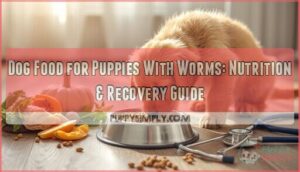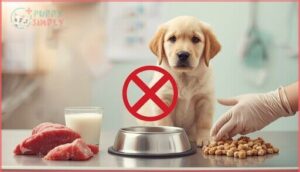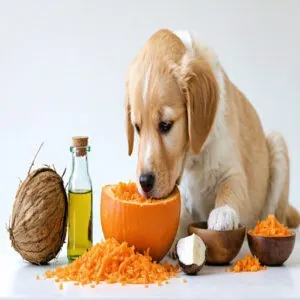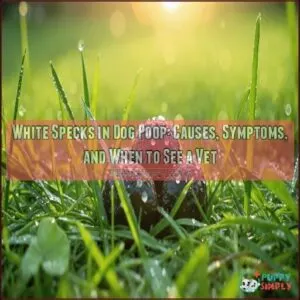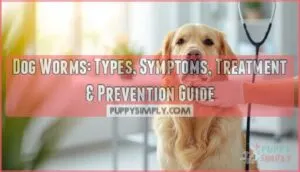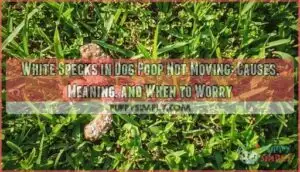This site is supported by our readers. We may earn a commission, at no cost to you, if you purchase through links.
When a puppy contracts intestinal worms—and up to 90% of them do in certain regions—proper nutrition becomes just as critical as medication. Parasites rob growing dogs of essential nutrients at the exact developmental stage when they need them most, creating a cascade of health challenges from stunted growth to compromised immunity.
The right dog food for puppies with worms doesn’t just fill their belly; it replenishes what these parasites steal, nourishes a ravaged digestive system, and gives their small bodies the resources to mount a recovery. Your puppy’s bowl holds more power than you might realize during treatment, but not all foods meet the demanding nutritional needs of a parasite-battling system.
Table Of Contents
- Key Takeaways
- Recognizing Worm Infestations in Puppies
- Health Risks of Worms in Puppies
- Nutritional Needs for Puppies With Worms
- Commercial Puppy Foods for Worm-Infested Dogs
- Homemade Diets for Puppies With Worms
- Natural Ingredients for Deworming Puppies
- Probiotics and Supplements for Recovery
- Feeding Schedule for Worm-Affected Puppies
- Foods to Avoid With Worm Infestations
- Transitioning to a Regular Diet Post-Deworming
- Frequently Asked Questions (FAQs)
- What food is good for puppies with worms?
- What gets rid of worms in puppies?
- Can I touch my puppy if he has worms?
- Do puppies eat more when they have worms?
- What are initial signs of worms in puppies?
- How often should puppies be wormed?
- Can puppies catch worms from adult dogs?
- Do worms affect a puppys growth rate?
- Are puppies born with worms?
- Can worms cause permanent damage to puppies?
- Conclusion
Key Takeaways
- Puppies with worms need nutrient-dense food featuring 22-28% high-quality protein, easily digestible carbohydrates like rice, and moderate fiber to replenish what parasites steal while supporting their compromised digestive systems during recovery.
- Worm infestations cause measurable damage beyond discomfort—infected puppies experience 12-25% reductions in weight gain, delayed skeletal development by 1-2 weeks, and malabsorption issues that reduce feed efficiency by 15-20% even during treatment.
- Feed worm-affected puppies 3-4 smaller meals daily instead of two large ones, adjusting portions upward by 5-30% depending on infestation severity, while monitoring weekly weight changes as even 2% fluctuations signal the need for dietary adjustment.
- Natural ingredients like pumpkin seeds and probiotics can support recovery by creating a less hospitable gut environment and rebuilding intestinal flora, but they cannot replace veterinary-prescribed dewormers which remain the only effective treatment for eliminating parasites.
Recognizing Worm Infestations in Puppies
Catching a worm infestation early can make all the difference in your puppy’s recovery and long-term health. You’ll need to know what signs to watch for—from visible changes in their body and behavior to what’s showing up in their stool.
Let’s walk through the key indicators that signal your puppy might be dealing with intestinal parasites.
Common Types of Worms in Puppies
Intestinal worms plague up to 90% of puppies in certain regions, making parasite identification your first line of defense. Understanding each worm’s lifecycle helps you protect your pup and prevent transmission.
- Roundworm infection: Toxocara canis affects most parasitized puppies, often transmitted before birth
- Hookworm symptoms: Ancylostoma caninum causes anemia in 5–20% of clinic-examined puppies
- Tapeworm transmission: Dipylidium caninum spreads through flea-infested environments, affecting 1–15% of puppies
- Whipworm prevention: Trichuris vulpis triggers chronic diarrhea in 2–10% of cases
- Less common parasites: Eucoleus species appear regionally in small percentages
For effective learning, consider exploring AP study resources to understand complex topics.
Physical Symptoms of Worm Infestation
Your puppy’s body will sound the alarm when intestinal worms strike. Watch for diarrhea causes like mucoid or bloody stool in 40–60% of whipworm cases, while roundworms trigger that telltale pot-belly and dull coat.
Hookworms bring anemia signs—pale gums and lethargy—in up to 30% of severe infections. You might notice abdominal pain, weight loss, or occasional skin issues signaling a parasite problem needing attention.
Behavioral Changes Due to Worms
Beyond those visible symptoms, a parasitic burden reshapes your puppy’s personality. Worm infestation doesn’t just affect digestion—it drains the energy and enthusiasm that define puppyhood.
- Lethargy signs: Infected puppies show 15–30% less activity, spending more time resting than exploring their surroundings
- Irritability causes: Abdominal discomfort from intestinal worms triggers crankiness in 40–60% of cases
- Appetite fluctuations: About 30–50% experience unpredictable eating patterns during heavy parasite loads
- Play behavior changes: Reduced curiosity and socialization delays appear in 25–35% of worm-positive puppies
Stool Examination for Worm Detection
When behavioral shifts raise your suspicion, a proper stool sampling confirms what’s happening inside your puppy’s gut. Fresh samples collected within 24 hours give the clearest picture—fecal analysis using zinc sulfate flotation achieves over 95% accuracy for parasite identification. Your vet may recommend three consecutive daily samples to catch intermittent shedding, improving worm detection rates by 20–30%.
Accurate diagnosis relies on research network collaborations to identify key themes.
| Diagnostic Method | Detection Rate | Best Application |
|---|---|---|
| Zinc sulfate flotation | 95%+ specificity | Roundworms, hookworms, whipworms |
| Baermann technique | 70–90% sensitivity | Lungworm larvae in respiratory cases |
| Fecal centrifugation | 20–40% improvement over standard | Mixed infections, low egg counts |
| PCR-based tests | Highest sensitivity | Co-infections, lab confirmation |
Microscopy tests remain the benchmark for intestinal health assessment. A negative result doesn’t rule out a worm infestation—repeat testing every 2–4 weeks ensures nothing slips through. This systematic approach to parasite control, combined with vet guidance on deworming protocols, protects your dog from ongoing damage.
Health Risks of Worms in Puppies
Worms don’t just cause discomfort—they actively compromise your puppy’s health in ways that can persist if left unchecked. Understanding these risks helps you recognize why timely treatment and proper nutrition matter so much during recovery.
Let’s look at the specific ways parasites affect your puppy’s well-being.
Impact on Growth and Development
Worms steal more than just nutrients—they hijack your puppy’s entire growth trajectory. Infected puppies experience 12–25% reductions in weight gain during the first six to eight weeks, with severe cases delaying skeletal development by one to two weeks.
Worms hijack your puppy’s growth, slashing weight gain by 12–25% and delaying skeletal development by weeks
Growth delays, nutrient deficiencies, and immune suppression create compounding developmental risks.
Recovery strategies combining deworming with targeted canine nutrition restore gut health and support catch-up growth, protecting long-term puppy nutrition and dog health outcomes.
Digestive and Nutritional Consequences
Malabsorption issues wreak havoc long after you’ve spotted the first symptom. Your dog with worms can’t properly utilize nutrients, triggering fat-soluble vitamin losses and gut inflammation that reduces feed efficiency by 15–20%.
Recovery diets demand elevated caloric needs—think high protein diet formulas with easily digestible ingredients, plus probiotics to rebuild gut health and reverse the nutrient deficits that compromise growth.
Transmission Risks to Other Pets
In multi-pet households, shared living spaces can trigger cross-contamination. Studies show that 42% of homes with infected puppies report parasite control failures in resident cats.
Fecal–oral pathways increase infection rates among cohabiting pets by 35%, making pet hygiene and household risks critical.
Delayed worm infestation treatment correlates with a 1.5-fold spike in secondary cases, compromising intestinal health across your entire household.
Nutritional Needs for Puppies With Worms
When your puppy’s fighting a worm infestation, the right nutrition becomes as important as the dewormer itself. A weakened digestive system and compromised nutrient absorption mean you can’t just feed any old puppy food and hope for the best.
Let’s break down exactly what your pup needs to rebuild strength, support immune function, and get back on track.
Essential Nutrients for Immune Support
Your puppy’s immune system needs a strong arsenal to fight back against parasitic invaders—and that means targeted vitamin therapy, mineral supplements, and antioxidant benefits to support both immunity boost and nutrient absorption.
You’ll want to prioritize vitamins A, D, E, and B-complex alongside zinc and selenium, as these immune boosters directly strengthen gut health and cellular defenses.
Adding probiotics bolsters natural remedies for recovery, optimizing overall dog nutrition during treatment.
Protein Requirements for Recovery
Your puppy’s protein intake becomes mission-critical during recovery. You’ll need to target 22–28% of daily energy from high-quality sources to rebuild tissue and fuel immune support. Recovery diets should deliver 1.5–2.0 grams per kilogram of body weight daily, emphasizing amino acid needs like lysine and methionine.
This nutrient balance fosters gut health and an immunity boost alongside probiotics and natural remedies.
Digestible Carbohydrates and Fats
After deworming, your puppy’s compromised gut can’t handle complex starches. Choose easily digestible carb sources like rice or dehulled grains—they improve feed efficiency by 12–25% over high-fiber alternatives.
For fat absorption, medium-chain triglycerides in quality dog food boost DHA/EPA uptake by 15%, supporting digestive health.
Energy-dense blends with low-glycemic digestible fibers stabilize blood sugar while probiotics and natural remedies aid nutrient uptake during recovery.
Importance of Dietary Fiber
While digestible carbs fuel recovery, fiber plays a different role in your puppy’s gut health. At 3–6% of daily intake, fiber regulates stool consistency—improving it by 18–25% during deworming.
Soluble sources like pumpkin seeds and psyllium support nutrient absorption and digestive health, while prebiotics strengthen gut barriers.
Proper dietary management pairs fiber with natural remedies, optimizing canine nutrition and diet for parasite clearance.
Commercial Puppy Foods for Worm-Infested Dogs
When your puppy’s dealing with worms, choosing the right commercial food can make a real difference in how quickly they bounce back. Not all puppy foods are created equal—some formulas are specifically designed to support recovery while you’re working through deworming treatment with your vet.
Here’s what to look for in a quality commercial diet that’ll help your pup fight off parasites and get back to their playful self.
High-Quality Protein Sources
Recovery starts with the right fuel. When your dog with worms needs to rebuild strength, look for proteins with biological value above 90%—think chicken, turkey, and fish.
These animal sources deliver complete amino acid profiles and enhanced protein digestibility, outperforming plant-based options by nearly 25% in nutrient bioavailability.
Unlike natural remedies or raw meat, commercial protein fractions support measurable recovery in canine dietary management.
Easily Digestible Ingredients
Once you’ve locked in high-quality protein sources, the next move is choosing gut-friendly foods your puppy can actually absorb. Digestible carbs like rice and oatmeal spare an inflamed intestine, while moderate fiber benefits stool consistency during recovery. Here’s what bolsters canine nutrition and diet during deworming:
- Hydrolyzed proteins reduce digestive workload and support immune function
- Easily digestible starches (rice, potato) improve nutrient balance without gut stress
- Soluble fiber sources normalize stool and bolster digestive health
- Low-fat formulations prevent pancreatic overload in weakened puppies
- Pumpkin seeds and psyllium offer natural parasite deterrence alongside dog wellness support
Limited Ingredient Diets
When your puppy’s gut is already compromised by parasites, fewer ingredients mean fewer chances for irritation. Limited ingredient diets strip out common allergens and use single protein sources—23% rely on one animal protein exclusively.
You’ll find digestible starches like rice paired with novel proteins, supporting nutrient balance while your pup battles worms. That simplicity matters when immune support counts most.
Immune-Boosting Formulas
Fortified formulas target immune system rebuilding through concentrated nutrient boosters. Antioxidants like vitamin E and selenium lower inflammation markers by 12–20% in dewormed pups.
You’ll see probiotic supplements raising protective antibodies markedly, while zinc bolsters white blood cell function during parasitic stress. Some brands add antiparasitic herbs for dietary fortification, though pharmaceutical dewormers remain your primary tool.
Look for balanced dog health and nutrition that combines immune system support with digestibility, ensuring natural remedies complement—not replace—veterinary treatment in your canine nutrition and diet strategy.
Homemade Diets for Puppies With Worms
You might be wondering if preparing food at home can support your puppy’s recovery while they’re dealing with worms. The short answer is yes—when done right, homemade diets give you control over ingredients and freshness, which can be especially helpful for puppies with compromised digestive systems.
Let’s walk through what you need to know about creating balanced meals, cooking safely, managing portions, and adding natural deworming ingredients to your puppy’s bowl.
Balanced Recipes for Recovery
You’ll want to build each meal around highly digestible protein—skinless chicken or turkey works best—paired with plain rice or potato for gentle carbohydrate energy. Add cooked pumpkin for gut healing and fiber, then consider plain yogurt for probiotic support if your pup tolerates dairy.
Aim for 22–28% protein in the overall recovery nutrition plan, focusing on nutrient balance that aids digestive health without overwhelming a compromised system. Meal planning should prioritize frequent, small portions.
Safe Cooking Methods
Proper heat treatment protects your puppy during recovery while preserving the nutrients they need most. Cooking techniques matter—you’ll want to reach 74°C (165°F) internal temperature to eliminate parasites while keeping meals easily digestible.
- Steam or boil proteins to maintain moisture and preserve digestibility by up to 22%
- Skip raw meats entirely; thorough cooking is your first line of parasite control and prevention
- Use gentle methods like poaching to protect B vitamins and support nutrient preservation
- Store cooked meats immediately in the fridge to prevent bacterial growth and maintain food safety tips
Portion Control and Meal Planning
You’ll need to rethink the usual feeding strategy when managing a dog with worms. Split daily calories into 3–4 smaller portion sizes rather than two large meals—this feeding schedules approach improves nutrient balance and reduces GI upset.
Track weight weekly; if your puppy isn’t gaining 50–100 g, calorie adjustment of 10–20% may be necessary. Meal frequency directly aids canine dietary management during recovery, optimizing dog nutrition for natural pet care and pet care and wellness outcomes.
Incorporating Natural Dewormers
Herbal supplements and natural remedies may support your puppy’s recovery, but they can’t replace prescription dewormers. Think of them as backup, not the frontline defense for parasite prevention and control.
- Pumpkin seeds (ground, unsalted) reduced intestinal parasite counts by 24% in one 2020 trial alongside conventional deworming methods
- Probiotics restore gut flora, supporting dog health and wellness during natural worm treatment
- Dietary fiber from plain pumpkin aids parasite passage and digestive motility
- Avoid garlic or herbal blends without veterinary approval—toxicity risks outweigh probiotic benefits in natural deworming methods
Natural Ingredients for Deworming Puppies
While veterinary dewormers remain the benchmark for eliminating parasites, certain natural ingredients can support your puppy’s recovery and create a less hospitable environment for worms.
These foods won’t replace prescribed medication, but they can complement treatment by strengthening gut health and providing mild antiparasitic properties.
Here’s what you can safely incorporate into your puppy’s diet during and after deworming.
Pumpkin Seeds as a Parasite Deterrent
Pumpkin seeds offer a mild parasite control advantage in puppies. When dosed at 1–2 grams per kilogram daily for two to three weeks, research shows a 20–40% reduction in parasite egg counts.
The cucurbitacin effects and dietary fiber in pumpkin seeds support intestinal health and wellness, hindering parasite attachment.
However, you shouldn’t rely on pumpkin seed benefits alone—pair natural deworming with veterinary-directed protocols for effective parasite prevention and control.
Carrots and Coconut for Gut Health
Carrots bring 2.8% dietary fiber by weight, supporting stool bulk and intestinal health during parasite recovery. Coconut oil’s medium-chain triglycerides may aid fat digestion in puppies with mild pancreatic insufficiency, though evidence specific to worm infestations remains limited.
You can use both as supportive components in your veterinary-guided plan, but don’t expect them to replace pharmacological deworming—they improve gastrointestinal health, not cure parasites.
Garlic and Turmeric for Parasite Control
While garlic’s allicin benefits and turmeric’s anti-inflammatory effects show promise in lab studies—curcumin reduced Giardia viability by 46% in vitro—don’t rely on them as natural antiparasitics for your puppy.
Bioavailability factors limit turmeric’s absorption, and garlic carries real toxicity risks in canine health. No clinical trials support these natural remedies for dog health as standalone dewormers.
Use veterinarian-prescribed anthelmintics instead, and watch for herbal interactions if you’re considering any supplements.
Herbal Remedies and Safety
Before you reach for wormwood or apple cider vinegar, understand that herbal medicine isn’t always puppy-safe. Botanical toxicity threatens young systems—some natural dewormers trigger hepatotoxicity, and herbal interactions with standard anthelmintics alter drug efficacy. Phytochemical safety requires veterinary guidance, especially when:
- Pumpkin seeds lack standardized dosing for puppies
- Garlic causes hemolytic anemia at typical doses
- Concentrated botanicals risk neurotoxicity in developing dogs
Probiotics and Supplements for Recovery
Once you’ve addressed the worm infestation with veterinary-prescribed treatment, your puppy’s gut needs reinforcement to bounce back. Parasites disrupt the delicate balance of intestinal flora and can compromise nutrient uptake, leaving your pup vulnerable even after the worms are gone.
The right probiotics and targeted supplements work alongside deworming protocols to restore digestive function and strengthen immunity during recovery.
Beneficial Bacteria for Gut Health
Think of your puppy’s gut microbiome as a bustling community—when worms disrupt it, probiotics restore order. Adding probiotic supplements during deworming can boost immune system function and improve digestive health, with studies showing 15–25% reductions in gut inflammation.
You’ll strengthen microbial balance by incorporating fermented vegetables, kefir, or bone broth alongside pumpkin seeds, giving your pup’s recovery a solid foundation.
Digestive Enzymes for Nutrient Absorption
When parasites compromise your puppy’s gastrointestinal health, enzyme supplements become your ally in fighting malabsorption issues. Adding protease and amylase during worm infestation treatment can boost protein digestion and nutrient uptake by 9–14%, studies show.
These supplements help a dog with worms absorb essential nutrients for immune system support, turning each meal into an opportunity for healing—especially when paired with natural remedies for dog health.
Omega-3 Fatty Acids for Inflammation
EPA and DHA deliver powerful anti-inflammatory effects that combat the gut damage caused by worm infestation treatment in puppies. Your pup’s immune system support gets a measurable boost when omega-3 supplements reduce inflammatory markers like IL-6 by up to 30%.
- Fatty acid benefits include restored intestinal barrier function during gastrointestinal health recovery
- Inflammation reduction helps stabilize weight and energy in canine health
- Gut health support improves nutrient absorption compromised by parasites
- Typical doses range 100–300 mg/kg/day combined EPA+DHA under veterinary guidance
Herbal Supplements for Parasite Control
You’ll find herbal efficacy claims for natural remedies like pumpkin seeds, garlic, wormwood, and black walnut—but veterinary consensus doesn’t support these botanical safety profiles in puppies. Garlic can trigger anemia at low doses, while dietary adjuncts like apple cider vinegar lack proven parasite resistance benefits.
Standard anthelmintics remain your safest bet; herbal supplements should only accompany veterinarian-approved protocols, never replace them.
Feeding Schedule for Worm-Affected Puppies
When your puppy is fighting off worms, the way you feed matters just as much as what you feed. Strategic meal timing and portion control help their compromised digestive system absorb nutrients while minimizing gastrointestinal stress during treatment.
Here’s how to structure feeding for ideal recovery.
Frequency and Timing of Meals
When your puppy is fighting worms, meal frequency becomes a cornerstone of recovery. Breaking daily food into 3–4 smaller servings every 3–4 hours aids digestion rates and energy intake while the gastrointestinal health in dogs rebuilds. This approach maximizes nutrient timing and eases the burden on a compromised system.
- Enhanced absorption: Smaller, frequent meals improve immune system support for dogs during active treatment
- Stable energy: Regular feeding schedules prevent blood sugar dips in weakened puppies
- Monitoring clarity: Consistent timing helps you track stool patterns and treatment response in your dog with worms
Portion Sizes Based on Health Status
Your pup’s worm burden determines how much food they need. Mild infestations call for 5–10% extra calories to fuel recovery, while severe cases may require 20–30% more to offset malabsorption.
| Infestation Severity | Portion Adjustment |
|---|---|
| Mild burden | +5–10% daily intake |
| Moderate infestation | +10–15% for appetite support |
| Severe malabsorption | +20–30% to prevent weight loss |
| Post-deworming week | +5–12% during reintroduction |
Always pair portion adjustments with veterinary advice and frequent weight monitoring for ideal canine health.
Monitoring Food Intake and Weight
Track your pup’s daily food intake down to the gram—caloric needs shift fast during treatment. Weigh them weekly; in puppies undergoing deworming, even a 2% weight fluctuation signals you need dietary adjustments.
Meal frequency matters: three controlled feedings support nutrient balance and canine health better than free feeding.
If appetite drops or weight stalls, contact your vet immediately for customized pet care guidance.
Foods to Avoid With Worm Infestations
When your puppy is fighting a worm infestation, certain foods can actually make things worse by feeding parasites or compromising their already-stressed digestive system. You’ll want to steer clear of anything that creates a hospitable environment for worms or slows down your puppy’s recovery.
Here’s what to keep out of your puppy’s bowl until they’re parasite-free and back on track.
High-Sugar Foods That Feed Parasites
Sweet treats might seem harmless, but they’re actually fueling the problem. Studies show that diets high in added sugars—over 10% of total energy—can increase intestinal parasite loads by up to 22% in dogs with worms.
Tapeworm, whipworm, and other parasites thrive on simple sugars, making gut health worse and slowing your puppy’s recovery during treatment.
Raw Meats and Parasite Risks
Raw meat carries hidden dangers for a dog with worms. Recent surveys found 2–4% of commercial raw pet foods contained viable parasitic eggs, including tapeworm and whipworm. Even freezing at -20°C for seven days doesn’t eliminate all stages of parasite viability.
Raw poultry particularly harbors Giardia and Cryptosporidium.
Veterinary guidelines recommend avoiding raw meats entirely during your puppy’s recovery—parasite transmission risks outweigh any perceived benefits.
Toxic Foods for Puppies
Beyond parasite-laden raw meats, certain toxic foods pose compounded threats to your puppy with worms. Chocolate ingestion triggers vomiting and tremors—1–2% of worm-compromised cases require emergency care. Xylitol causes hypoglycemia and liver failure. Grapes initiate kidney injury within 24–72 hours. High-sodium foods worsen dehydration in intestinal parasites cases. You can’t afford these hazardous substances during recovery.
Transitioning to a Regular Diet Post-Deworming
Once your puppy completes deworming treatment, you can’t just flip back to their old feeding routine overnight. The shift needs careful attention to how their body responds as the parasite burden clears and their digestive system rebuilds.
You’ll want to watch for three key signals that tell you when and how to adjust their diet back to normal.
Monitoring Stool and Appetite Changes
You’ll notice that your puppy’s stool quality and appetite fluctuations tell the story of recovery progress. As intestinal parasites clear after dewormer treatment, watch for these telltale signs that your dog with worms is improving:
- Stool consistency shifts from watery to formed within 5–7 days
- Appetite normalization occurs as gut health stabilizes
- Color changes from pale or tarry to healthy brown
- Parasite detection decreases with each bowel movement
These gastrointestinal health markers guide your dietary adjustments and confirm whether veterinary guidance remains necessary.
Follow-Up Veterinary Visits
Generally, you’ll schedule your first post-treatment care appointment 7–14 days after deworming to verify parasite clearance and assess puppy recovery. Your veterinarian will perform fecal testing and evaluate weight gain, appetite normalization, and stool quality—critical health monitoring markers that guide deworming schedules and intestinal parasite management.
Veterinary follow-ups document treatment response and catch persistent worm burdens requiring alternative veterinary care and advice strategies.
| Visit Timeline | Tests & Observations | Expected Outcomes |
|---|---|---|
| Day 7–14 | Stool float, weight check | Initial clearance confirmation |
| Week 2–4 | Second fecal test | Verify no reinfection |
| Day 30+ | Physical exam, weight | Appetite normalized, growth on track |
| Ongoing | Veterinary guidance and advice | Long-term dog health strategy |
Long-Term Dietary Strategies for Prevention
After deworming, you’ll design a nutrition therapy plan spanning 6–8 weeks, incorporating immune boosting elements and parasite control strategies.
High-quality protein above 25% aids immune system support for dogs, while probiotics improve gastrointestinal health in dogs and gut health.
This diet planning approach considers comprehensive dog health, preventing reinfection in your dog with worms while strengthening resistance against future parasites.
Frequently Asked Questions (FAQs)
What food is good for puppies with worms?
Puppies with worms need nutrient-dense foods featuring easily digestible proteins, moderate fiber like pumpkin seeds for gastrointestinal health, and immune-supporting supplements.
Prioritize gut health through balanced puppy nutrition that aids parasite recovery while preventing further complications.
What gets rid of worms in puppies?
Veterinary-grade dewormers like praziquantel and fenbendazole achieve over 90% efficacy against roundworms and hookworms.
Combine pharmaceutical treatment with gut-supportive nutrition and follow-up fecal testing to confirm parasite clearance and restore your puppy’s health.
Can I touch my puppy if he has worms?
Worried about cuddling your pup? You can touch your puppy with worms—handwashing after contact reduces parasite transmission risk by over 90%.
Avoid face contact and maintain hygiene practices to protect human safety from zoonotic risks.
Do puppies eat more when they have worms?
It depends. Some puppies with worms may eat more due to poor nutrient absorption and energy deficits, while others show appetite loss.
Monitor your puppy’s feeding patterns and consult your vet.
What are initial signs of worms in puppies?
Like sending a telegram in the digital age, spotting worm infection means watching for swollen bellies, visible roundworms or tapeworms in stool, scooting behavior from hookworms, diarrhea, vomiting, and stunted growth requiring immediate health monitoring.
How often should puppies be wormed?
You’ll need to deworm your puppy at 2, 4, 6, and 8 weeks, then monthly until three months old. After that, deworming frequency depends on fecal testing and your veterinarian’s parasite control recommendations.
Can puppies catch worms from adult dogs?
Unfortunately, it’s an open-and-shut case: puppies absolutely catch worms from adult dogs. Maternal infection drives vertical transmission of roundworms and hookworms through the placenta and milk, while environmental contamination spreads parasites among household pets.
Do worms affect a puppys growth rate?
Yes—parasites drain essential nutrients, creating development delays and nutrient deficits. Infected puppies often show reduced weight gain of 2–4 kg over weeks, with parasite burden impacting their immune system and overall canine health markedly.
Are puppies born with worms?
Bad news travels fast—and so do parasites. Most puppies arrive carrying worms from their mother via placental transfer or nursing.
Toxocara canis often reaches puppies before birth, making early deworming essential for neonatal parasites and intestinal health.
Can worms cause permanent damage to puppies?
Heavy parasite burdens can inflict lasting growth impairment, with weight deficits reaching 20–30% in severe cases.
Hookworms may cause chronic anemia, while roundworms occasionally trigger intestinal obstruction—both with potential long-term consequences for your dog’s health.
Conclusion
Your puppy’s food bowl represents more than sustenance—it’s the foundation their recovering body builds upon while battling internal invaders. Strategic nutrition paired with veterinary deworming transforms dog food for puppies with worms from simple fuel into therapeutic intervention.
Monitor their progress closely, adjust portions as their vitality returns, and maintain preventive feeding practices long after the parasites disappear. Recovery isn’t just about eliminating worms; it’s about rebuilding what they destroyed from the inside out.
- https://www.sciencedirect.com/science/article/pii/S0749208123000268
- https://www.science.gov/topicpages/i/identifying+key+research
- https://www.britannica.com/dictionary/subtopic
- https://improveinternational.com/uk/clinical-library/beyond-medication-why-nutrition-matters-in-parasite-control-in-dogs
- https://www.nature.com/articles/s41598-017-03662-4

